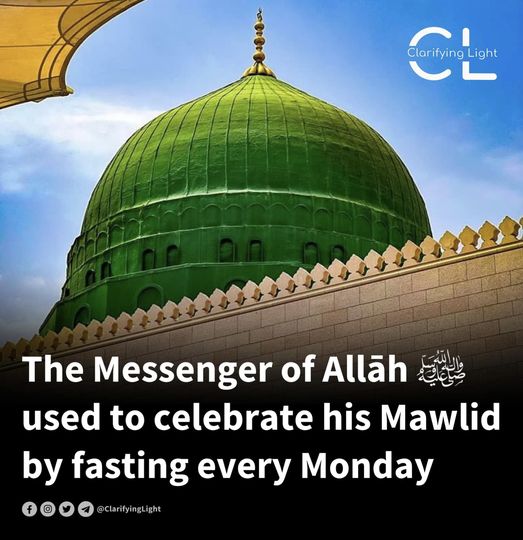Sayyidunā Abū Qatāda al-Anṣārī reported that Allāh’s Messenger ﷺ was asked about fasting on Monday, whereupon he ﷺ said:
“It is (the day) when I was 𝐁𝐎𝐑𝐍 and revelation was sent down to me.” [Ṣaḥīḥ Muslim]
Here the Beloved Prophet ﷺ mentions “وُلِدْتُ” and shows the emphasis of doing a good act due to the link and reason of his blessed birth. Fasting is a form of worship (‘ibāda), so one can celebrate this day by any form of ‘ibāda. One can fast or read Qur’ān, Ḥadīth, Poetry and Sīrah or hold gatherings or provide food to the poor or give charity, all being acts of worship. The Prophet ﷺ didn’t only used to fast, he ﷺ also used to slaughter an animal on account of his birth!
Furthermore, there is 𝐧𝐨 prohibition on setting a time or place for a group of people to have a gathering of thanking Allāh ﷻ and praising the Prophet ﷺ as well as the fact all actions done in Mawlid are Sunnah and within the boundaries of the Sharī’ah as the Sacred Law has already clarified what is forbidden and what is not.
According to Imām al-A’dham Abū Ḥanīfa and Imām ash-Shāfi’ī there is an established rule:
“𝐓𝐡𝐞 𝐞𝐬𝐬𝐞𝐧𝐜𝐞 𝐨𝐟 𝐚𝐥𝐥 (𝐞𝐯𝐞𝐫𝐲𝐭𝐡𝐢𝐧𝐠) 𝐢𝐬
𝐩𝐞𝐫𝐦𝐢𝐬𝐬𝐢𝐛𝐢𝐥𝐢𝐭𝐲 𝐮𝐧𝐥𝐞𝐬𝐬 𝐩𝐫𝐨𝐡𝐢𝐛𝐢𝐭𝐞𝐝”
This is sufficient to believe the permissibility of celebrating the Mawlid according to Imām al-A’dham Abū Ḥanīfa and Imām al-Shāfi’ī for it has 𝐧𝐨𝐭 been prohibited in the Qur’ān and Sunnah, rather endorsed and recommended (𝐦𝐮𝐬𝐭𝐚𝐡̣𝐚𝐛). The Ṣaḥāba used to hold gatherings where they collectively commemorated and praised the Prophet’s ﷺ birth which is the essence of Mawlid that is imitated by Ahl al-Sunnah wa’l Jamā’ah. If people do it slightly different today by performing extra good deeds on Mawlid then there is 𝐧𝐨𝐭𝐡𝐢𝐧𝐠 to prevent them from doing that in the Sharī’ah, and every scholar who has studied Uṣūl al-Fiqh understands this very well. #Mawlid
